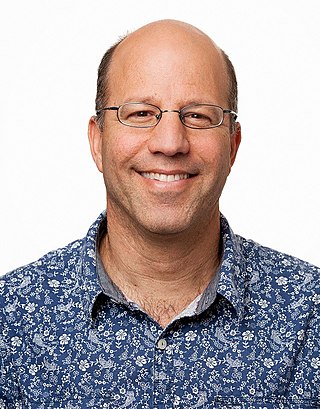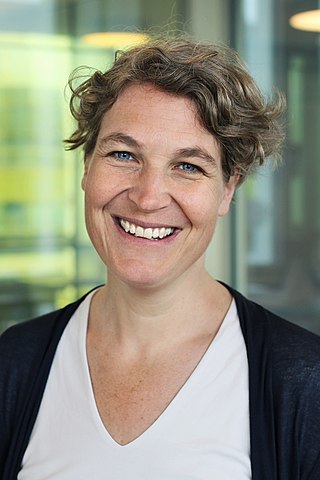Related Research Articles
Stanford University School of Medicine is the medical school of Stanford University and is located in Stanford, California. It traces its roots to the Medical Department of the University of the Pacific, founded in San Francisco in 1858. This medical institution, then called Cooper Medical College, was acquired by Stanford in 1908. The medical school moved to the Stanford campus near Palo Alto, California, in 1959.

Elaine V. Fuchs is an American cell biologist famous for her work on the biology and molecular mechanisms of mammalian skin and skin diseases, who helped lead the modernization of dermatology. Fuchs pioneered reverse genetics approaches, which assess protein function first and then assess its role in development and disease. In particular, Fuchs researches skin stem cells and their production of hair and skin. She is an investigator at the Howard Hughes Medical Institute and the Rebecca C. Lancefield Professor of Mammalian Cell Biology and Development at The Rockefeller University.

David Baker is an American biochemist and computational biologist who has pioneered methods to predict and design the three-dimensional structures of proteins. He is the Henrietta and Aubrey Davis Endowed Professor in Biochemistry and an adjunct professor of Genome Sciences, Bioengineering, Chemical Engineering, Computer Science, and Physics at the University of Washington. He serves as the Director of the Rosetta Commons, a consortium of labs and researchers that develop biomolecular structure prediction and design software. The problem of protein structure prediction to which Baker has contributed significantly has now been largely solved by DeepMind using artificial intelligence. Baker is a Howard Hughes Medical Institute investigator and a member of the United States National Academy of Sciences. He is also the director of the University of Washington's Institute for Protein Design.

Philippa "Pippa" Marrack, FRS is an English immunologist and academic, based in the United States, best known for her research and discoveries pertaining to T cells. Marrack is the Ida and Cecil Green Professor and chair of the Department of Biomedical Research at National Jewish Health and a distinguished professor of immunology and microbiology at the University of Colorado Denver.
Brigid L. M. Hogan FRS is a developmental biologist noted for her contributions to mammalian development, stem cell research and transgenic technology and techniques. She is currently a Professor in the Department of Cell Biology at Duke University, Born in the UK, she became an American citizen in 2000.

Kirstin Matthews is a Fellow in Science and Technology Policy at the James A. Baker III Institute for Public Policy. Matthews received a bachelor's degree in biochemistry from the University of Texas at Austin and a PhD in molecular biology from the University of Texas Health Science Center. Matthews has published multiple policy recommendations pertaining to stem cell research, climate change, and health care.
Utpal Banerjee is a Distinguished Professor of the Department of Molecular, Cell and Developmental Biology at UCLA. He obtained his Bachelor of Science degree in Chemistry from St. Stephen's College, Delhi University, India and obtained his Master of Science degree in Physical Chemistry from the Indian Institute of Technology, Kanpur, India. In 1984, he obtained a PhD in Chemistry from the California Institute of Technology where he was also a Postdoctoral Fellow in the laboratory of Seymour Benzer from 1984-1988.
Andrea Hilary Brand is the Herchel Smith Professor of Molecular Biology and a Fellow of Jesus College, Cambridge. She heads a lab investigating nervous system development at the Gurdon Institute and the Department of Physiology, Development and Neuroscience. She developed the GAL4/UAS system with Norbert Perrimon which has been described as “a fly geneticist's Swiss army knife”.

Sarah C.R. Elgin is an American biochemist and geneticist. She is the Viktor Hamburger Professor of biology at Washington University in St. Louis, and is noted for her work in epigenetics, gene regulation, and heterochromatin, and for her contributions to science education.
Ulla Hansen is a professor emerita of biology at Boston University. Her research group focuses on the study of transcription factor LSF.

Professor Ilan Davis is a Wellcome Trust Senior Fellow and holds the chair of Cell Biology at the Department of Biochemistry, University of Oxford. Previously (1996-2007) he was a group leader at the Wellcome Trust Centre for Cell Biology, University of Edinburgh. In 2011, he was elected as an EMBO fellow.
Brian David Dynlacht, is an American Biochemist and Professor in the Department of Pathology of New York University Grossman School of Medicine at NYU Langone Health, where he is also the Scientific Director of Genomic Facility. Before moving his lab to New York University, he was an Associate Professor in the Department of Molecular and Cellular Biology at Harvard University. In 2002, while researching at the Harvard University, Dynlacht reported the discovery of CP110, which is now thought to be at the center of a molecular switch governing the centriole to ciliary transition in mammalian cells. His lab identified the first centriolar deubiquitinating enzyme, USP33, whose expression regulates centrosome biogenesis via deubiquitination of the centriolar protein CP110, and thus regulates the centrosome duplication.
Heinrich (Henri) Jasper is a German-American biologist at Buck Institute for Research on Aging. He was formerly a professor of biology at The University of Rochester. He studies aging, stem cell function, and tissue regeneration.
Ruth Lehmann is a developmental and cell biologist. She is the Director of the Whitehead Institute for Biomedical Research, succeeding David Page. She previously was affiliated with the New York University School of Medicine, where she was the Director of the Skirball Institute of Biomolecular Medicine, the Laura and Isaac Perlmutter Professor of Cell Biology, and the Chair of the Department of Cell Biology. Her research focuses on germ cells and embryogenesis.
Kalappa Muniyappa is an Indian molecular biologist and geneticist, known for his researches on the chromatization of DNA and gene targeting. He is a professor and chairman of the department of biochemistry of the Indian Institute of Science and an elected fellow of the Indian National Science Academy, Indian Academy of Sciences and the National Academy of Sciences, India. The Council of Scientific and Industrial Research, the apex agency of the Government of India for scientific research, awarded him the Shanti Swarup Bhatnagar Prize for Science and Technology, one of the highest Indian science awards, in 1995, for his contributions to biological sciences.
Elly Margaret Tanaka is a biochemist and senior scientist at the Research Institute of Molecular Pathology (IMP) in Vienna, Austria. Tanaka studies the molecular cell biology of limb and spinal cord regeneration as well as the evolution of regeneration.
Haifan Lin is a Chinese-born American stem cell biologist. He is the Eugene Higgins Chair Professor of Cell Biology at Yale University and the founding Director of the Yale Stem Cell Center. He previously founded and directed the Stem Cell Research Program at Duke University. Recognized for his significant contributions to stem cell research, he was elected to the US National Academy of Sciences and American Academy of Arts and Sciences in 2018.
Daniela Drummond-Barbosa is a Brazilian-American geneticist who is a Professor of Biochemistry and Molecular Biology at the Johns Hopkins Bloomberg School of Public Health. Her research considers stem cell regulation.
Anthony Mahowald is a molecular genetics and cellular biologist who served as the department chair of the molecular genetics and cellular biology department at the University of Chicago. His lab focused on the Drosophila melanogaster, which is often referred to as fruit fly, specifically focusing on controlling the genetic aspect of major developmental events. His major research breakthroughs included the study of the stem cell niche, endocycles, and various types of actin.

Andrea Pauli is a developmental biologist and biochemist studying how the egg transitions into an embryo, and more specifically the molecular mechanisms underlying vertebrate fertilisations, egg dormancy, and subsequent egg activation. Her lab uses zebrafish as the main model organism. Andrea Pauli is a group leader at the Research Institute of Molecular Pathology (IMP) at the Vienna Biocenter in Austria.
References
- 1 2 "Hannele Ruohola-Baker". University of Washington. Retrieved 10 September 2015.
- ↑ "Ruohola-Baker Lab". Ruohola-Baker Lab. Retrieved 10 September 2015.
- ↑ "Hannele Ruohola-Baker, Biochemistry". University of Washington. Retrieved 10 September 2015.[ permanent dead link ]
- ↑ Center for Oral History. "Hannele Ruohola-Baker". Science History Institute .
- 1 2 3 Benschoten, William Van (27 May 2002). Hannele Ruohola-Baker, Transcript of an Interview Conducted by William Van Benschoten at University of Washington Seattle, Washington on 20, 21 and 27 May 2002 (PDF). Philadelphia, PA: Chemical Heritage Foundation.